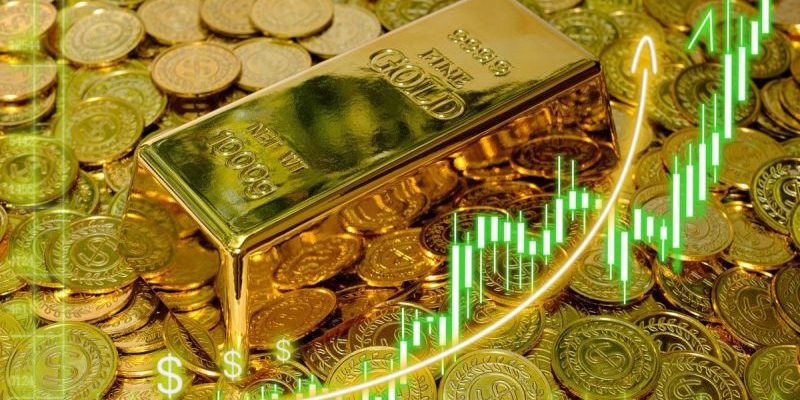
The gold price saw incredible momentum in 2024, gaining almost 30 percent during the period.
As the start of 2025 approaches, the world is facing a great deal of uncertainty. Several regions are experiencing geopolitical instability, and a new US president could bring further chaos to an already fragile global economy.
What does this mean for gold, and what should investors expect in the new year?
How will Trump affect the gold price in 2025?
A key question for investors is how Donald Trump’s second term will affect gold.
Trump’s campaign promises included lower taxes, the introduction of broad tariffs on foreign goods and sweeping immigration reforms that would result in the deportation of millions of undocumented laborers.
Economists widely view his promises as inflationary. They come at a time when the US and global economies are still recovering from high inflation caused by COVID-19, and could cause a delay in lowering interest rates.
While gold is viewed as an inflation hedge, high interest rates imposed by central banks over the past three years have pushed investors toward interest-bearing assets like bonds; meanwhile, gold based-products have seen outflows.
The US Federal Reserve is expected to pause rate cuts in 2025, with analysts speculating that it’s taking a wait-and-see approach to the effects that Trump’s policies will have on the US economy.
“People could get so optimistic about Trump’s ‘pro-growth’ agenda that investors start deploying more of the mountain of cash they’re sitting on … but Elon and Vivek going to Washington with Milei’s chainsaw could scare markets,” he said.
“Trump likes to keep the opposition, domestic or foreign, on edge. His unpredictability is his weapon of choice. Looking at some of his administration picks and the potential clash with the Federal Reserve, I suspect taking a hard view on sentiment for 2025 is not a wise game for now,” he said via email.
Barrett suggested that investors hold some money on the sidelines until they can determine how Trump’s presidency begins and whether his return lives up to his pre-election promises, especially regarding conflicts overseas.
Geopolitical pressures in play for gold
Trump’s return to the White House is just one of the geopolitical situations that could affect gold in 2025.
In 2024, ongoing conflicts in the Middle East and Eastern Europe influenced the price of gold, most notably when Russian President Vladimir Putin floated the possibility of a nuclear escalation in November.
Tiggre noted that flareups tend to drive gold, but the effects are usually temporary and revert back to trend.
“Fortunately, that trend is currently upward. I suppose that if Trump could actually end the war in Ukraine in a day, there might be a bit less safe-haven demand, but I don’t believe he can,’ he explained.
‘So even if gold retreats after each successive scare, there’s no real downside for gold here.’
However, Tiggre added that if one of the conflicts in Gaza, Ukraine or even Taiwan were to escalate into a direct military conflict between major world powers, it would likely send gold “screaming” upward.
Central banks still a key driver for gold
The last few years have been characterized by strong central bank buying of gold.
Asia, the Middle East and some Eastern European countries are leading the way. Although not all countries report their purchases, the ones that do are carefully tracked by the World Gold Council.
Although there appeared to be a slowdown in central bank buying in the middle of the year, Joe Cavatoni, senior market strategist, Americas, at the World Gold Council, said it rebounded strongly at the end of 2024.
‘In October, we saw a rebound in central bank buying, with 60 metric tons of net purchases; this was the highest monthly amount reported year-to-date, at a time when the gold price was still making gains,” he said.
Looking forward to 2025, Cavatoni said he expects central banks to still be a major driver for the price of gold even though the metal is priced near all-time highs. “This continued interest reaffirms gold’s role as a strategic asset that goes beyond the price to manage risks and diversify reserves,” he said.
“The growing share of India and the Middle East in global GDP has an additional impact on the demand for gold, especially given the increasing use of gold as a reserve in these areas,” she said.
The scale of central bank purchases has provided gold with a critical support structure, and has also fueled speculation that the precious metal may be used to back an alternative reserve currency to the US dollar.
Barrett suggested this trend has been ongoing for the past 15 years.
He said central banks have been net buyers of gold since 2010 at about 7,000 metric tons. As the ultimate buy-and-hold participant, their activity has not only removed significant supply from the market, but has also contributed to current market conditions, which have made gold attractive to a wide audience.
Gold M&A activity lagging despite price strength
Tiggre expressed surprise at the lack of deals in the gold space given current high prices.
“The larger players simply have not made enough discoveries. If they don’t want to mine themselves out of existence, they’re going to have to buy more of the companies that have done the work,” he said.
Kandoshko echoed this sentiment, saying mergers are a means for larger companies to access exploration projects, expand reserves and optimize costs. She believes 2024’s higher prices could pave the way for deals in 2025.
Barrett believes mergers haven’t happened for a myriad of reasons, chiefly that the price of gold hasn’t reached the level to overcome the economic factors that have driven industry costs over the last several years.
“I suspect the main reason is the massive rise in production costs and higher interest rates … labor, energy and raw materials have all risen significantly,” he said. The implication is that higher returns have yet to be realized — gold miners still haven’t overcome higher operating costs due to today’s economic situation.
Investor takeaway
Central banks are expected to continue supporting the gold price in 2025; however, with Trump entering office, his policies could pull gold in different directions. It may be hard for investors to know what to do.
Cavatoni suggested that a strong US economy and lower deficit under Trump would push the dollar higher, leading to investors seeking to add riskier assets to their portfolios. “If this is what develops as a reaction to Trump’s mandate, it would be supportive to gold allocations as a safe haven,” he said.
For her part, Khandoshko sees gold maintaining its upward momentum, saying she sees the metal increasing to US$2,800 in the next six months and rising to US$3,000 at some point during the new year.
Although reluctant to make a prediction, Tiggre also believes gold will trend higher in 2025.
“How much higher? It is hard to say, but a real all-time-high of just under US$3,500 is less than 35 percent higher than where we are today. That seems doable,” he said.
If gold continues moving up, it could give gold companies the boost they need and could create new opportunities for investors who have been taking a wait-and-see approach.
Maybe more than ever, 2025 is bringing political and economic uncertainty that could see strategies compete between pursuing riskier equities or adding more exposure to gold through bullion or gold-backed products.
The smart play may be to not jump into 2025 headfirst and instead take some time to see how key situations develop through the first part of the year.
Securities Disclosure: I, Dean Belder, hold no direct investment interest in any company mentioned in this article.










